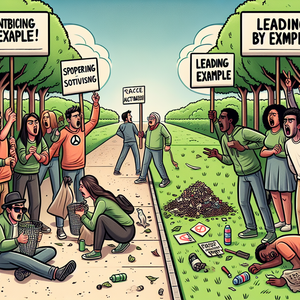The Intersection of Sustainability and RSM Careers

As organizations increasingly prioritize sustainability, the demand for RSM professionals who can effectively incorporate environmental considerations into their practices has surged. Companies are coming to terms with the fact that effective risk management now encompasses environmental risks, regulatory compliance, and corporate social responsibility. This paradigm shift has led to the emergence of specialized roles focused on sustainability within RSM, including Environmental Risk Assessors, Sustainability Managers, and Compliance Officers.
Example of Emerging Roles
Take the role of a Sustainability Manager, for instance. This position involves not only the development and implementation of sustainability strategies that align with an organization's goals but also the assessment of the environmental impact of business operations and ensuring compliance with environmental regulations. The skills required for this role often include knowledge of environmental science, project management, and stakeholder engagement. The increasing complexity of regulatory environments and market expectations means that organizations are keen to hire professionals who can navigate these challenges effectively.
Emerging Career Opportunities
The intersection of sustainability and RSM has given rise to various innovative job titles that reflect the changing landscape. One such role is the Resilience Officer, tasked with helping organizations prepare for and respond to environmental challenges such as climate change and natural disasters. This role necessitates a deep understanding of risk assessment methodologies and the ability to collaborate across departments to create comprehensive resilience plans. Additionally, the concept of the circular economy—which emphasizes waste reduction and resource optimization—is gaining traction. This shift has led to the creation of roles focused on minimizing environmental impacts while maximizing operational efficiency. Professionals in these roles not only focus on compliance but also work proactively to develop strategies that align with sustainable business practices.
Skills for Success in Sustainable RSM Careers
To thrive in these emerging roles, professionals in the RSM field must cultivate a unique skill set that blends traditional risk management expertise with a robust understanding of sustainability principles. Key skills include: 1. Analytical Skills: Professionals must be adept at analyzing data related to environmental risks and sustainability metrics. Familiarity with analytics tools and the ability to interpret data are crucial for informed decision-making. 2. Communication: Given the complexity of sustainability concepts, effective communication is essential. RSM professionals must convey information to stakeholders at various organizational levels, including preparing reports, delivering presentations, and engaging with community members. 3. Interdisciplinary Knowledge: A comprehensive grounding in environmental science, economics, and regulatory frameworks is vital. Staying updated on the latest trends in sustainability and understanding their implications for risk management practices is essential for success. 4. Collaboration: Sustainability initiatives often necessitate cross-departmental collaboration. RSM professionals should be skilled in working with diverse teams, including those from operations, finance, and marketing, to implement sustainable practices effectively.
The integration of sustainability into Risk Management and Safety Management careers marks a pivotal shift within the industry. As organizations continue to prioritize sustainable practices, the demand for RSM professionals equipped with the necessary skills and knowledge will only increase. By embracing the intersection of sustainability and risk management, professionals can enhance their career prospects while contributing to a more sustainable future. As the landscape continues to evolve, those who adapt and innovate will find themselves at the forefront of this exciting and impactful field. The opportunities are abundant, and those ready to engage with sustainability initiatives will not only secure rewarding careers but also play a crucial role in shaping a more sustainable world.
Environmental Risk Assessor
Environmental consulting firms, large corporations with sustainability initiatives (e.g., multinational corporations like Unilever or BP)
Core Responsibilities
Conduct risk assessments to identify potential environmental impacts associated with business operations and projects.
Develop and recommend mitigation strategies to minimize identified risks.
Collaborate with regulatory agencies to ensure compliance with environmental laws and regulations.
Required Skills
Strong analytical skills with the ability to interpret environmental data.
Knowledge of environmental regulations and assessment methodologies.
Experience in stakeholder engagement and report writing.
Sustainability Manager
Corporations committed to sustainability (e.g., IKEA, Tesla), non-profit organizations focused on environmental advocacy
Core Responsibilities
Design and implement sustainability strategies that align with corporate goals and objectives.
Monitor and report on sustainability metrics, including carbon footprint and resource usage.
Engage with stakeholders to promote sustainability initiatives and foster a culture of environmental responsibility within the organization.
Required Skills
Project management experience, particularly in sustainability-focused projects.
Strong communication skills to effectively convey sustainability goals to various audiences.
Understanding of sustainability frameworks and certifications (e.g., LEED, ISO 14001).
Resilience Officer
Government agencies, non-profits focused on disaster preparedness, large corporations with comprehensive risk management frameworks
Core Responsibilities
Develop and implement resilience plans to prepare for and respond to climate-related risks and natural disasters.
Assess organizational vulnerabilities and create strategies to enhance resilience across departments.
Collaborate with local governments and community organizations to align resilience efforts with broader initiatives.
Required Skills
Expertise in risk assessment methodologies and emergency management.
Strong leadership and collaboration skills to work with various stakeholders.
Knowledge of climate science and its implications for business operations.
Compliance Officer (Environmental Focus)
Manufacturing firms, energy companies, and organizations with significant environmental compliance requirements
Core Responsibilities
Ensure organizational adherence to environmental laws, regulations, and industry standards.
Develop and implement compliance programs, including training for employees on environmental responsibilities.
Conduct regular audits and assessments to identify compliance gaps and recommend corrective actions.
Required Skills
In-depth knowledge of environmental laws and regulations (e.g., EPA guidelines).
Strong attention to detail and analytical skills to assess compliance risks.
Excellent communication skills for reporting and engaging with staff at all levels.
Circular Economy Specialist
Companies focusing on sustainable product development (e.g., Patagonia, Nike), consulting firms specializing in sustainability solutions
Core Responsibilities
Develop and implement strategies to promote resource efficiency and waste reduction within the organization.
Analyze supply chain processes to identify opportunities for circular economy practices.
Collaborate with product development teams to design products with a focus on sustainability and reusability.
Required Skills
Knowledge of circular economy principles and sustainable design.
Strong analytical and problem-solving skills to optimize processes.
Ability to communicate effectively with cross-functional teams to drive initiatives.


